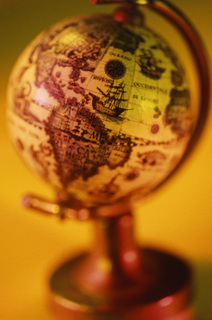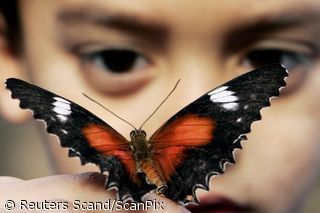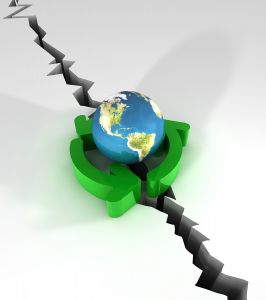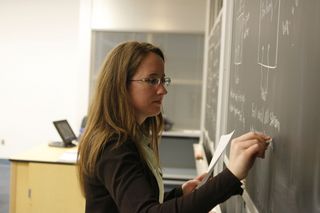CERN's New Particle Accelerator Promises Window on Big Bang
Published:
25 July 2004 y., Sunday
Scientists probing something as big as the origins of the universe sometimes need equipment to match. At the European nuclear research center CERN in Geneva, they're building the most powerful particle accelerator ever. The Large Hadron Collider, as it's called, is expected be able to recreate the conditions that existed at the time of the Big Bang, when the universe was born. Scientists say they hope the new tool will help them unravel the mysteries of matter and energy, and confirm or demolish existing theories.
Contrary to what its name implies, the Big Bang was not necessarily an explosion. Scientists consider the Big Bang to be more of a marker to note that the universe had a beginning. It is the moment in which the universe, space and time were created. CERN Physicist Richard Jacobsson says scientists do not know why or how the Big Bang occurred. But big particle accelerators such as the Large Hadron Collider help them to understand the process.
When the Large Hadron Collider (LHC) is completed in 2007, the superconducting magnets in the machine will operate at 271 degrees, just above absolute zero. However, Mr. Jacobsson says that the temperature created in the proton-proton collisions will be one billion times hotter than at the center of the sun.
Some 6,500 scientists from more than 80 countries currently collaborate on hundreds of ongoing experiments at CERN. The world's biggest particle physics laboratory is celebrating its 50th anniversary this year.
Šaltinis:
voanews.com
Copying, publishing, announcing any information from the News.lt portal without written permission of News.lt editorial office is prohibited.
The most popular articles

The European Commission announced today the award of three of the six contracts for the procurement of Galileo’s initial operational capability.
more »
 A European monitoring system that can detect floods and help target help in natural disasters like in Haiti is being discussed by MEPs.
more »
A European monitoring system that can detect floods and help target help in natural disasters like in Haiti is being discussed by MEPs.
more »
 The World Bank, supported by the Global Facility for Disaster Reduction and Recovery (GFDRR), announced today that it has mobilized scientists and technical experts around the world to help assess the impacts of the earthquake in Haiti.
more »
The World Bank, supported by the Global Facility for Disaster Reduction and Recovery (GFDRR), announced today that it has mobilized scientists and technical experts around the world to help assess the impacts of the earthquake in Haiti.
more »
 The Spanish Minister of Education, Ángel Gabilondo, speaking in the Culture, Education and Youth Committee of the European Parliament, insisted on the importance of strengthening the idea of a Social Europe by means of a new link between the economy and education, one of the basic pillars of the Spanish Presidency's proposals in the area of education.
more »
The Spanish Minister of Education, Ángel Gabilondo, speaking in the Culture, Education and Youth Committee of the European Parliament, insisted on the importance of strengthening the idea of a Social Europe by means of a new link between the economy and education, one of the basic pillars of the Spanish Presidency's proposals in the area of education.
more »
 The EU’s goal of stopping animal and plant extinctions by 2010 has not been reached. Now more action is planned – for proper long-term protection of biodiversity by 2020.
more »
The EU’s goal of stopping animal and plant extinctions by 2010 has not been reached. Now more action is planned – for proper long-term protection of biodiversity by 2020.
more »
 Climate change and biosecurity were the focus of the EU stand at this year's BT Young Scientist exhibition, which took place in Dublin this month.
more »
Climate change and biosecurity were the focus of the EU stand at this year's BT Young Scientist exhibition, which took place in Dublin this month.
more »
 Meas Sokhunthea, a shy 8th grade student at Preah An Kosa secondary school in Siem Reap town, has wanted to be a teacher since she was a little girl.
more »
Meas Sokhunthea, a shy 8th grade student at Preah An Kosa secondary school in Siem Reap town, has wanted to be a teacher since she was a little girl.
more »
 The European Commission announced today the award of three of the six contracts for the procurement of Galileo’s initial operational capability.
more »
The European Commission announced today the award of three of the six contracts for the procurement of Galileo’s initial operational capability.
more »
 The European Commission has presented the results of the first-ever survey on creativity and innovation in schools.
more »
The European Commission has presented the results of the first-ever survey on creativity and innovation in schools.
more »
 The European Year of Creativity and Innovation 2009 is coming to an end with a closing conference organised today in Stockholm by the European Commission and the Swedish Presidency.
more »
The European Year of Creativity and Innovation 2009 is coming to an end with a closing conference organised today in Stockholm by the European Commission and the Swedish Presidency.
more »
 At the Council meeting on 15 December in Brussels, the EU agriculture and fisheries ministers discussed animal welfare labelling and better protection for laboratory animals, and reached an agreement on rules against illegally logged timber.
more »
At the Council meeting on 15 December in Brussels, the EU agriculture and fisheries ministers discussed animal welfare labelling and better protection for laboratory animals, and reached an agreement on rules against illegally logged timber.
more »